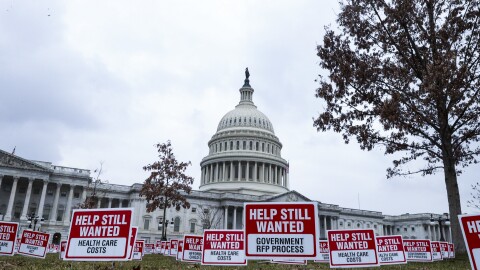President Biden’s $1.9 trillion coronavirus relief measure could deliver long awaited aid to state and local governments. City and state leaders are eager for funding, but the measure still has to pass the U.S. Senate.
The first COVID-19 relief bill, known as the CARES Act, set aside money for states and large municipalities. But since then, Congress has failed to deliver direct aid to local governments.
Columbus Auditor Megan Kilgore argues the ideas in the new $1.9 trillion "American Rescue Plan" are popular in large cities and small communities like her hometown of Gallipolis.
“Our citizens are truly not that different,” Kilgore says. “My Gallipolis friends worry about the future just like my friends here in Columbus, and both groups regardless of their political affiliation support much of what Biden is proposing.”
Kilgore joined other local officials and U.S. Sen. Sherrod Brown (D-Ohio) on a press call Monday organized by Protect Our Care Ohio and For Our Future Ohio.
With broad public support for the new relief bill, Kilgore can’t understand GOP opposition to the measure. The proposal passed the House without a single Republican vote, and many Republican senators – including Sen. Rob Portman (R-Ohio) – say they won't support it.
“We continue to see a puzzling disconnect between public opinion and the actions Republicans are taking in Congress,” Kilgore says. “Make no mistake, Biden’s plan protects our American workers and our families who need it most.”
The CARES Act set aside $150 billion for state and local governments to help pay for COVID-19 related expenses. Biden's plan more than doubles that, with a $350 billion appropriation.
Columbus was the only city in Ohio to qualify for direct funding under the CARES Act, receiving almost $157 million of the $4.5 billion sent to Ohio. But even as funding began to get divvied up, many worried there were too many restrictions on how the money could be spent.
A wave of business closures can wreck city budgets, which are reliant on local income tax revenue. Because CARES Act dollars had to go toward COVID-19 expenditures, the funding couldn’t be used to balance the books. Some local leaders worried about having to make cuts to police or fire.
The new measure not only spends much more on state and local support, it also offers greater flexibility by allowing governments to “replace revenue that was lost, delayed, or decreased” as a result of the public health emergency.
What questions do you have about COVID-19 and the response in Ohio? Ask below as part of our Curious Cbus series.
_





